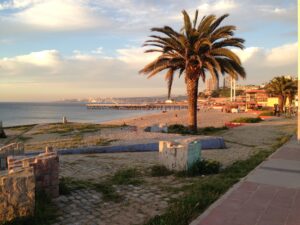Am I Doing Study Abroad Right?!— The Fear of Missing Out While Abroad


“You are abroad — you should take advantage of this opportunity!” I heard this well-meaning phrase a lot while studying abroad and perhaps most often repeated to myself in the back of my mind whenever I tried to make a decision in Chile. But what seems like a motivating combination of words can actually be anxiety-inducing because it pushes you to doubt yourself and to constantly ask “Am I really taking full advantage of this opportunity?! What if I’m not?”
My Experience In Chile

Valparaiso is a magical city. It has a vibrant nightlife ranging from smooth Jazz to EDM concerts. During the day there are various cultural events, interesting festivals, and endless labyrinths of mural-covered streets to explore. On top of all of this, since Chile is situated in between the impressive Andes and the beautiful coastline, there is no shortage of natural landscape to take in. Therefore, it feels like there is always something to do. This also means that it feels like there was always something to miss out on.
This isn’t that drastically different from how you might feel at your university back home, but when walking on a new street is an experience in itself and you have a limited amount of time to process a lot of new experiences, the fear of missing out becomes more acute. It can be an extra stress on top of what you are already experiencing. This was one of my biggest challenges while studying abroad.
Set Your Own Priorities

Doing the most isn’t always best. What helped me the first weeks was deciding to dedicate my time and my emotional resources to only a few things. Committing to them doing them well, and building relationships over time, was one of the more fulfilling aspects of my study abroad. This may not work for everyone, but it was something that helped ground me. It made me feel good about how I was spending my time.
Another important aspect is taking time to reflect and decide what are the main things you want to gain from your study abroad experience. Trying to go beyond just defining it as “ I want to try a lot of new things”. Because the broader your goal is the harder it is to feel satisfied and it won’t help in alleviating feelings of self-doubt. For example, I knew before coming to Chile that one of my goals was to try and ski in Chile. I even brought all my ski gear for this purpose. With this goal in mind, I felt a lot happier with my decisions to go on a ski adventure one weekend, even if I knew that I would be missing out on other things that weekend.
Don’t Compare Yourself

Not comparing yourself to others is much easier said than done, especially while studying abroad, but trying to at least be conscious of this process was a key component of maintaining my mental health. The first and most immediate thing to be aware of is how easy it is to compare your experience to the other international students with whom you are studying. I was lucky to be surrounded by a lot of wonderful and talented individuals and therefore it was difficult not to question why sometimes I wasn’t doing or achieving the same things they were.I soon realized though, that they too doubt themselves and that we are all just trying to do our best in this foreign context, trying to find our own truth.
Another bad habit I fell into for a bit was comparing myself to my peers, who were either at my university back home or on a different study abroad experience. I would talk to friends or look at social media and see these incredible experiences others were having and then I would start to question my own. This can be a very tiring dynamic, but it is important to realize that your experience will never look like theirs precisely because it is your own. Additionally, they are probably also going through challenges and difficulties that just aren’t being shared.
Finally, the most difficult comparison I coped with was not comparing my present and actual study-abroad self to my imagined and idealized study abroad self. It is easy to have high hopes and a lot of expectations for what your study abroad experience will look like and what type of person you will be, but sometimes these expectations do not match the reality of the situation. That’s ok. On the one hand, it is good to have some ideas of what you would like to achieve, but don’t let these goals become some rigid set of standards you have to live up to.
Being There is Enough
The pressure to not miss any opportunities can be overwhelming, but what is important to remember is that you can’t and shouldn’t try to do everything. Focus instead on taking some sort of action regardless of how small or insignificant it may seem. You already applied to study abroad, got a visa, flew halfway across the world and just for that you can feel accomplished. Even things like trying new food, walking on a different street than you normally do, or asking an extra question in class are all worth celebrating.
Because if something is for sure, worrying about whether you are doing enough or the right thing is taking away from the experiences you are and could be having. “Missing out.” is a somewhat silly notion that’s no worth being afraid of. Because what I would say actually counts as “missing out” is worrying so much about what you aren’t doing that you don’t actually enjoy what you are doing.
Sophia P. | Sociology Major | Colorado College | Chilean Universities Program in Valparaiso, Chile | Fall 2017 | IFSA Content Marketing Intern